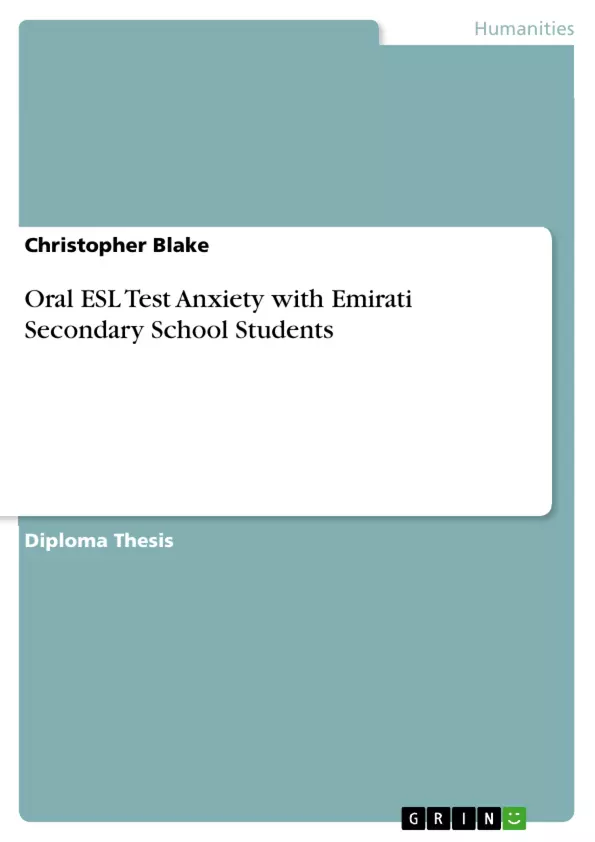In the UAE and globally, high-stakes testing is prevalent in second language learning. One important and integral part of high-stakes English language tests is the oral proficiency interview, which can be a pre-requisite to gaining admission to an English-speaking university.
The volunteer participants were 25, 15-17-year-old Emirati students from two IGCSE ESL classes that I do not teach. This study included a videotaped mock oral proficiency IGCSE interview; audiotaped semi-structured individual interviews, questionnaires, and an audiorecorded semi-structured focus group discussion. The findings suggested that language and test anxiety is multi-faceted and can affect boys and girls in a number of different ways and at different times during class activities and also in an OPI. In addition, all participants showed different physical signs of test anxiety during the first two stages of the OPI, and these physical signs of test anxiety were considerably less frequent in the final part of the OPI. The causes and types of anxiety reported by the students ranged from language learning difficulties, problems trying to retrieve appropriate English vocabulary, code switching from Arabic language to English and vice versa, differences in social status of the teachers/language instructors, and unfamiliarity with the interlocutor.
The pedagogical implications of these findings for understanding anxiety and oral test anxiety with second language students for teachers, schools and examination boards are discussed, as are suggestions for future research. Furthermore, considering the important role of teachers in second language pedagogy and the use of English as the main language of instruction, this study also offers suggestions to lessen anxiety for oral class activities and oral assessments, and presents test-taking strategies.
Inhaltsverzeichnis (Table of Contents)
- Overview of the Study
- Statement of the Problem
- Roles of the Researcher
- Review of Chapters and Appendices
- Review of the Literature
- What Is an Oral Proficiency Interview
- Common Formats of an OPI
- Validity and Reliability in Oral Proficiency Interviews
- Construct Validity
- Construct-irrelevant Variance
- Predictive Validity
- Content Validity
- The Link between Reliability and Validity
- Reliability
- Factors Affecting Reliability
- Test Administration Reliability
- Rater Reliability
- Test Reliability
- Context of Test Questions
- Student-Related Aspects of Reliability
- Gender Differences and Interlocutor Effect
- Language Learning Anxiety
- Types of Anxiety Related to Language Learning
- Communication Apprehension
- Test Anxiety
- Fear of Negative Evaluation
- Factors Affecting Anxiety
- Student Beliefs
- Learner Self-esteem
- Instructor Beliefs
- Environmental Factors and Anxiety
- Gender Issues
- The Effects of Language Anxiety
- Physical Manifestations of Anxiety
- Cognitive Difficulties
- Input
- Processing
- Output
- Schema Theory and Oral Response
- Social Effect of Being Evaluated
- Washback
- Washback and the Effect on Teachers
- Washback and the Impact on Education and Society
- Achieving Positive Washback on Tests
- Learning and Test-Taking Strategies
- Anxiety-Reducing Strategies
- IGCSE ESL Oral Proficiency Interview Exam
Zielsetzung und Themenschwerpunkte (Objectives and Key Themes)
This study aims to examine the experiences and perceptions of Emirati secondary school students regarding anxiety in both classroom settings and oral assessments, specifically focusing on oral proficiency interviews. The study explores the different types of anxiety experienced by students, their strategies for preparing for oral tests, and the effectiveness of these strategies in managing anxiety during oral proficiency interviews. The research also investigates physical manifestations of test anxiety and potential gender differences in anxiety levels during an Edexcel IGCSE ESL OPI test.
- Examining the nature and sources of oral test anxiety among Emirati secondary school students.
- Investigating the impact of language learning anxiety on students' performance in oral proficiency interviews.
- Exploring the effectiveness of test-taking strategies for managing oral test anxiety.
- Identifying potential gender differences in oral test anxiety and their underlying causes.
- Analyzing the implications of these findings for teachers, schools, and examination boards in promoting effective language learning and reducing anxiety.
Zusammenfassung der Kapitel (Chapter Summaries)
The first chapter provides an overview of the study, outlining the research problem, the researcher's role, and a brief overview of the chapters and appendices. The second chapter delves into a comprehensive review of relevant literature, covering various aspects of oral proficiency interviews, including their format, validity, reliability, and the factors that influence their effectiveness. The chapter also explores the complexities of language learning anxiety, different types of anxiety, factors affecting anxiety, and the impact of anxiety on students' language learning processes.
Schlüsselwörter (Keywords)
This study focuses on the themes of oral test anxiety, second language learning, high-stakes testing, oral proficiency interviews, Edexcel IGCSE ESL OPI, Emirati secondary school students, test-taking strategies, and language learning anxiety. The study examines the causes, effects, and management of test anxiety among Emirati secondary school students.
- Quote paper
- Christopher Blake (Author), 2011, Oral ESL Test Anxiety with Emirati Secondary School Students, Munich, GRIN Verlag, https://www.grin.com/document/181410



